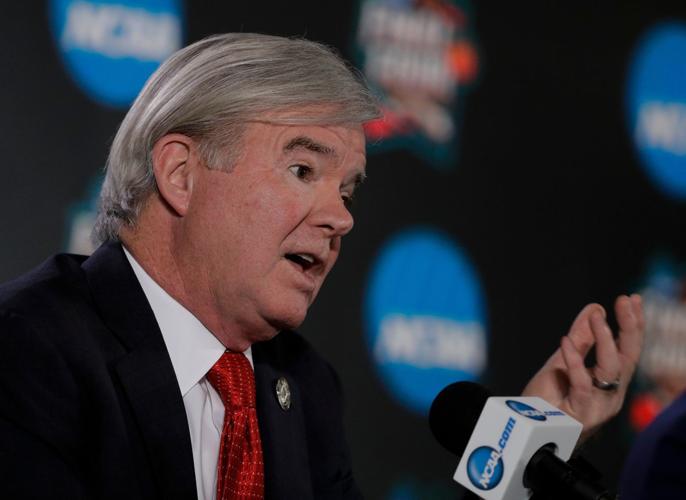
NCAA President Mark Emmert speaks during a news conference at the Final Four in San Antonio.
NEW YORK — NCAA investigations into schools implicated in the ongoing federal case involving college basketball "have already been launched," but no resolution is expected before the Final Four, NCAA President Mark Emmert said Wednesday.
That means those schools, including No. 2 and unbeaten Kansas, could play under a cloud of suspicion deep into March Madness.
"We obviously want to make sure that we're doing everything that we can to promote the ethics of the game," Emmert said during the Learfield Athletics Forum in Manhattan. "This whole incident cast a very bad light on college basketball and we need to deal with it as effectively as we can and we're not going to have everything wrapped up by the Final Four, that's for sure, because these trials are still going to be going on."
Emmert said the NCAA is working in conjunction with the FBI on the investigations. The FBI hasn't "dumped all their files" at the NCAA office in Indianapolis yet, he said.
People are also reading…
This fall's federal fraud trial focused on Kansas and Louisville, so-called "Adidas schools" because of their affiliation with the shoe company. The trial involving former ÃÛèÖÖ±²¥ assistant Emanuel "Book" Richardson is set to begin in April. Attorneys for Richardson and his co-defendants have asked that the federal charges be dropped, saying that the men didn't commit any crimes. Legal experts expect Richardson and the other defendants to pursue plea deals if the attorneys' motion is denied.
On Oct. 24, three men at the center of the ongoing federal investigation into college basketball corruption were found guilty of multiple felonies. A jury decided that former Adidas consultant Merl Code, Adidas executive Jim Gatto and would-be sports agent Christian Dawkins committed wire fraud and conspiracy to commit wire fraud by paying families of coveted basketball prospects to get them to commit to programs sponsored by the shoe company. The 48-year-old Gatto was found guilty on all three of his counts, and Dawkins, 25, and Code, 44, were found guilty on both of theirs. Sentencing is set for March 5.

Former UA assistant Book Richardson will go on trial in April 2019.
Asked about possible future penalties for Kansas, Louisville or N.C. State, all of which had coaches and/or runners allegedly involved in pay-for-play schemes, Emmert said he couldn't comment on ongoing cases.
"We don't talk about individual cases," he said.
Emmert said he followed the trial on a daily basis but chose not to attend because he would have been a "distraction."
"We were incredibly attentive to all of it and we had people every day at the trial," Emmert said. "I was following the transcript on a daily basis. I don't need to be in the room to know what's going on in the trial and we were very, very attentive to it.
"Of course we're deeply concerned about it. It's very disturbing revelations."
During the trial, former Adidas consultant Thomas "T.J." Gassnola testified he gave $40,000 to former N.C. State assistant Orlando Early in November 2015 to give to the father of coveted prospect Dennis Smith Jr. after the Wolfpack coaches feared Smith Jr. might decommit.
Gassnola also testified he gave the family of former Kansas forward Billy Preston $89,000 and the guardian of current forward Silvio de Sousa $2,500, and said he gave a family friend of former ÃÛèÖÖ±²¥ star Deandre Ayton $15,000 with hopes of steering him to the Jayhawks.Â
Dawkins and Brian Bowen Sr. also testified about an Adidas scheme to funnel $100,000 to Bowen Sr. in exchange for Brian "Tugs" Bowen attending Louisville.Â
Coaches currently at La Salle and De Paul were also implicated in paying players while at other places. All those coaches remain on staff at their present schools.
So far, N.C. State has taken no action. Kansas is sitting out de Sousa while investigating the situation. And Louisville fired athletic director Tom Jurich and former coach Rick Pitino in 2017, but there has been much speculation about potential future penalties at Louisville after Bowen Sr. testified that then-Louisville assistant Kenny Johnson gave him $1,300 for rent after Louisville had already been placed on probation.
Emmert said he would like to see the individual schools take responsibility for punishments.
"We need to make sure that schools are fulfilling their role in holding everybody accountable," he said. "The NCAA is an association of member schools and it's built upon the notion of collaboration and collegiality and there's an expectation among the other schools that they will also hold themselves accountable. So to the extent that doesn't happen, I think all the members are not happy with that."
As for a timeline, Emmert said the NCAA will vote in January to add five new "independent adjudicators" who will "report to a new group that will become members of the Board of Governors."
"Assuming that passes, after that vote, then there will be five new members added to the Board of Governors, and then we can put this into place," Emmert said. "It will be August before it's all in place."





